The long road from Noakhali to Manipur
By tomorrow, the Manipur violence that began on May 3 will have continued for five long miserable months.
Seventy-seven years ago — before Independence or Partition — it was in October that Gandhi, then in Delhi, learned about the Noakhali violence. Today we know of Noakhali, which is not very distant from Manipur, as a place within Bangladesh. In 1946, it belonged to the eastern half of the large and as yet undivided Indian province of Bengal, governed at the time by the Muslim League, with S Suhrawardy as the premier.
After holding “a silent court within himself” (to quote Pyarelal, Gandhi’s close companion and future biographer), Gandhi decided to proceed to Noakhali. When an “esteemed” but unnamed friend urged Gandhi not to go in his advanced age to a “dangerous” place, Gandhi evidently answered: “I do not know what I shall be able to do there. All I know is that I won’t be at peace with myself unless I go there.” Claiming that he was journeying to “wipe the tears” of Bengal’s women and “put heart into them if he could”, Gandhi boarded a train for Kolkata, en route to Noakhali, on October 28.
Bringing security to Noakhali’s Hindu minority was not his only objective in going there. Another Gandhi goal was to avert India’s partition. Research reveals the elements of Gandhi’s strategy for Noakhali, where he stayed from November 6, 1946 to March 4, 1947. One, he would meet everyone – Hindus, Muslims, Suhrawardy and ministers under him, police officers, district officers, influential citizens, anyone capable of helping. Two, he would speak frankly to everyone. Three, he would aim to instil courage in victims and contrition in attackers. Four, he would remind Noakhali’s Muslim majority that Islam did not stand for attacking the defenceless. Five, he would aim to win the people’s trust by living amongst them and, where possible, by serving them, including by attending to their medical needs.
When Noakhali’s Muslims told Gandhi that killings and forced conversions in the region did not add up to a large number, and that only a small minority of the Muslim population had joined in the violence, he replied that a fence-sitting majority was as guilty as the actual attackers. Even a single case of abduction, forcible conversion or forcible marriage was bad enough, Gandhi said.
On January 2, after spending six weeks in Srirampur, Gandhi, carrying a long bamboo staff, left on foot with a handful of companions to cover “a village a day”. Over the next two months, he and his companions would halt overnight in 47 different villages, mostly in humble homes. Their Hindu and Muslim hosts included dhobis, fishermen, cobblers and weavers.
Much of his time was spent with Hindu women stricken with fear. Nirmal Kumar Bose (who served as Gandhi’s interpreter) noticed what he described as Gandhi’s “daily ministrations on behalf of love” and “the extreme tenderness with which he regarded each individual” who related his or her woes to him.
Noakhali’s Muslims asked Gandhi why he was not in Bihar, where the scale of Hindu attacks on Muslims was larger than Noakhali’s attacks on Hindus. Early in March 1947, he did go to Bihar, where he soon learnt that the Congress leadership had accepted Partition.
In Noakhali’s Bhatialpur village, Muslims pledged to Gandhi that they would risk their lives to protect Hindus and do their utmost to get looted properties and abducted women restored. In the presence of Muslims who had earlier broken it, an idol was restored in a Bhatialpur temple. Walking alongside Gandhi, “a number of Muslim youths” assured him that “they would stand guarantee” against a recurrence of attacks on Hindus.
Gandhi’s four-month Noakhali stay did not prevent India’s or Bengal’s partition. But remorse grew, and Muslim elders started to punish anyone committing fresh acts of harassment or looting against Hindus. Many Hindus who had fled returned. Interviews by me in Noakhali in 2000 found many residents recounting precise memories of Gandhi. Many recalling him spontaneously sang “Raghupati Raghav Raja Ram, Ishwar Allah Tere Naam”.
Gandhi did not get all the results he desired in Noakhali, but he got some. In any case, he had confronted the problem.
